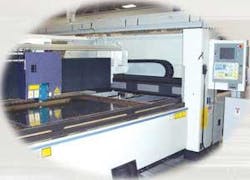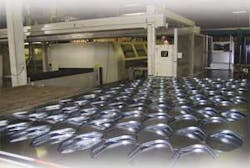Lean principles, big return
Midwest fabricator thrives on “one team, one goal” attitude
GenMet is a full-service metal fabricator, primarily servicing truck and construction OEMs and the point of purchase industry. With continuous equipment upgrades and lean business practices, GenMet’s annual sales have grown from $3M to $12M since it was purchased in 1999 by Mary and Eric Isbister.
The Isbisters are East Coasters who moved to and stayed in Wisconsin based on the business opportunities available in the Midwest. Prior to their move, Mary worked in organizational development at Pfizer Inc., and Eric spent 21 years building nuclear submarines for the Electric Boat division of General Dynamics in Connecticut.
GenMet, formerly known as General MetalWorks, relocated from Chicago to Milwaukee after the Great Chicago Fire of 1871. After the move, the original owners hired everybody they could and rented every horse stable available in the area to fabricate the metal needed to rebuild the city of Chicago.
null
Going lean
Today, GenMet is one of a growing body of US fabricators that follows lean manufacturing practices to reduce waste and improve overall customer value. Company CEO, Eric Isbister, credits the company’s success to its team culture. GenMet employees are continuously trained on lean manufacturing principles and play a critical part in maximizing efficiency and productivity.
“Every employee here adds value to the organization,” he explains. “Purchasing high-tech equipment is only beneficial if you have the culture to make the machines profitable.” This team environment starts from the very top. The company earned ISO certification in 2006 to provide the structure for building processes and supporting continuous improvement and employee involvement.
The Isbisters didn’t initiate the ISO certification process until they were certain the entire GenMet team would be committed to documenting all of the company’s processes.
“The ISO auditor complimented our staff for knowing exactly what to do, and the fact that they weren’t nervous during the auditing process,” Eric Isbister recalls. “The employees for each specific area had documented their own procedures, so they weren’t nervous because they knew their stuff.”
GenMet has been recertified twice since that time and the processes have been infused into the company’s employee training. “Some companies get ISO certified because of external pressures from their customers,” Isbister states. “We became ISO certified because of how the process would help us continuously improve overall. Getting new or better customers as a result of our certification is a secondary beneficial spin-off of the improvement process.”
The company is currently in the process of additional lean manufacturing training, assisted by Wisconsin Manufacturers Extension Partnership (WMEP). Every employee has been trained on lean principles. This company-wide training takes place approximately every three years. A dozen individuals received lean leader training, in which employees at all levels underwent thorough leadership training. These sessions were followed up with half-day sessions in which every employee became familiar with lean principles and the level at which they are expected to contribute.
Next, the company performed a value stream map study of the entire fabrication process from receipt of purchase order to delivery of parts. Cross-functional teams have been established to minimize any non-value-added work found during this process.
In the first week following the training, major employee-initiated changes took place. The forming department worked with the cutting (laser and turret) department to develop a First-In-First-Out lane (FIFO). This eliminated any movement of cut parts to shelves or piles (non-value-adding steps). It also eliminated lost parts. The welding department worked with the forming department to establish Kan-Ban and supermarket processes that instantly evened out work flow between work centers and between the company’s two plants.
The training will continue through the “5S + Safety Process,” where everything in the plant is investigated for Safety aspects, then Sorted, Straightened, Scrubbed, Systematized, and Standardized. Mary and Eric Isbister are expecting GenMet to rise to another level when all of the employees are driving parts of the lean manufacturing process.
GenMet is a Woman-Owned Small Business (WOSB), which helps many of its customers meet government requirements. To assist WOSBs, the Department of Defense awards a percentage of prime and subcontract opportunities to women-owned businesses each year.
GenMet President Mary Isbister serves on Milwaukee’s Next Generation Manufacturing Council and on the Board of the Wisconsin Manufacturing Extension Partnership. At the 2008 Wisconsin Manufacturing Matters Conference, she presented on the topic of lean manufacturing practices. The workshop, titled One Team, One Goal, addressed how companies could use ISO 9001 to increase revenue and capacity while creating a strong team, thus improving overall operations.
“Five or ten years from now, we’re not going to be producing the same products we are today,” she says. “Manufacturers must be innovative, find new ways to add value, and create products that are not easily replicated by low-wage overseas competitors. It’s a whole new ball game.”
System upgrade
When the Isbisters purchased GenMet, they inherited a standalone, 3000W Mitsubishi laser. They soon realized they needed a long-term advantage to stay competitive in today’s global market. They worked with Mitsubishi distributor Jeff Lampe of Advanced Manufacturing Solutions (AMS) to upgrade that machine to the company’s first automated laser system. The new system helped GenMet automate the manufacturing process, cutting lead times in half and minimizing the labor factor in quotes.
More recently, the company worked with AMS and Mitsubishi’s Encore division to trade in its existing equipment and trade up to a newer, more advanced laser system. The new Flexible Manufacturing System has two 3015LVP/40CFX Mitsubishi lasers operating with a 16-shelf material tower, six nest carts, and an automated material handling system. The new machines cut twice as fast as the previous ones did, and deliver better edge conditions, which have reduced debur requirements. The new system has allowed GenMet to transition into more complex, highly engineered products.
“Mitsubishi’s trade-in program makes it possible for small business owners to upgrade to state-of-the-art technology without starting from scratch,” says Isbister. “The service and training we’ve received from Mitsubishi over the past decade have been exceptional. The teams at AMS and NCell worked together to train our staff on the new systems, helping us maximize our efficiency. They’re showing us lessons learned outside of our company. We don’t need to reinvent the wheel. MITS, AMS, and Ncell are keeping us moving forward.”
The GenMet fab.
The GenMet fab.
null
Continued growth
Aided by its move toward automation and lean production, GenMet has experienced continuous growth. In 2007, the company purchased a second 16,200 ft2 facility in Slinger, WI, to house the company’s welding facility. Employee count has also grown from 50 to 80 employees in the past year. The Isbisters have infused GenMet employees with confidence that the automation and new equipment isn’t a threat to their jobs; they enable continued growth companywide.
In January 2008, Wisconsin Governor Jim Doyle chose to launch his Next Generation Manufacturing Plan from the GenMet site. The plan focuses on efficiency and lean manufacturing principles. Goals include making Wisconsin manufacturers more competitive by getting leaner and more efficient; expanding lean manufacturing across the state by assisting small- and mid-sized manufacturers; and creating next generation manufacturing tax credits by streamlining economic developmental programs.
“To remain competitive, our manufacturers must continue to become leaner and more efficient,” Governor Doyle said during the visit. These practices are the foundation on which GenMet has built its success.
Jeff Hahn ([email protected]) is senior product manager at Mitsubishi Laser (www.mitsubishi-laser.com) in Wood Dale, IL; ph 630/616-5920.



